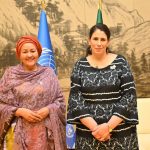Digital Inclusion and the Rural Divide: Are Nigeria’s Tech Gains Truly National?
By Dr. Aiyeku Olufemi Samuel
Co-Founder & Lead Consultant, Global Human Capital & Energy Management Limited
Governance Analyst | Development Economist | Policy Consultant | Strategic Development Advocate | Climate Action Enthusiast | Sustainability & Impact Investing Specialist | Girl-child Advocacy | PPP & CRM Specialist
”Access to information is not a privilege—it’s a fundamental right. But in Nigeria, is this right truly national or selectively urban?”
Introduction
As Nigeria surges ahead in digital transformation—from fintech revolutions and e-governance platforms to virtual education and mobile health—one question continues to challenge the authenticity of our digital progress:
Are these technological gains reaching the villages of Zamfara, the islands of Bayelsa, or the uplands of Taraba?
Or have we merely succeeded in creating a two-speed digital economy—one that races in Lagos but crawls in Lafia?
The Paradox of Progress
Nigeria, Africa’s largest economy by GDP, has made considerable strides in technology adoption:
Over 122 million active internet users as of 2023 (Nigerian Communications Commission, NCC).
Fintech transactions exceeding ₦387 trillion in 2023 alone.
Increasing adoption of eNaira, digital Ids, and mobile learning platforms.
But beneath these milestones lies a troubling reality:
Over 45 million Nigerians—mostly in rural communities—remain digitally excluded.
According to the World Bank, more than \51% of rural Nigerians lack access to mobile broadband or internet-enabled services. And even where connectivity exists, digital literacy, affordability, and infrastructure lag behind.
So we ask:
What good is a digital revolution if half the nation can’t log in?
The Rural Divide: A Structural Blind Spot?
While cities like Abuja, Lagos, and Port Harcourt have become digital hubs, rural Nigeria—where over 48% of our population resides—remains largely disconnected from the benefits of the digital age.
Ask a rural teacher in Yauri, a farmer in Jalingo, or a midwife in Gembu:
Can they easily access e-learning resources, agricultural extension apps, or telemedicine support?
More often than not, the answer is no.
The rural digital divide in Nigeria is caused by:
Poor infrastructure: Weak telecom signals, unreliable electricity, and limited tech hardware.
Low digital literacy: Many rural dwellers, especially women and the elderly, lack basic digital skills.
Affordability challenges: With over 40% of Nigerians living below the poverty line, buying smartphones or data bundles remains a luxury.
Neglected policy implementation: National digital policies are often written in Abuja, but seldom reach Akko or Awe.
Rhetorical Reality: Who Are We Really Developing For?
Is it enough to count broadband towers in megacities and declare national digital success?
Is a smart nation truly smart if it leaves its farmers, artisans, and rural youth behind?
These are not just rhetorical musings—they are moral imperatives and policy wake-up calls.
Digital inclusion is not charity. It is nation-building.
As Nobel Laureate Amartya Sen rightly said:
”Development is freedom—the freedom to access opportunities, to make choices, and to live with dignity.”
Can we say Nigeria is developed digitally when half of her citizens still lack the tools to participate?
Youth, Women & the Rural Future
70% of Nigeria’s youth population live in rural areas.
Rural women, especially widows and young mothers, face double discrimination: by geography and by gender.
Yet, these demographics hold the keys to Nigeria’s growth—if empowered with the right digital tools.
Imagine the transformation if a rural girl in Bauchi could access mobile scholarships.
Or a farmer in Otukpo could use blockchain to track crop sales.
Or a youth in Ogoni could learn coding remotely via solar-powered centers.
The power is not in the tech. It’s in the access.
What Must Be Done: Action Points for Policy & Stakeholders
• Massive Rural Connectivity Rollout
Leverage the Universal Service Provision Fund (USPF) to provide affordable broadband to underserved LGAs.
• Community Tech Hubs & Digital Literacy Programs
Establish rural innovation centers with training for youths, women, and local entrepreneurs.
• Zero-Rated Educational & Agricultural Platforms
Telcos must work with government to provide free or subsidized access to digital education and agricultural tools.
• Solar-Powered ICT Infrastructure
In off-grid areas, prioritize solar-based internet kiosks and digital health systems.
• Localized Content & Language Accessibility
Platforms must be adapted into local languages, using audio-visual content that considers illiterate or semi-literate users.
• Public-Private Partnerships (PPP)
Government alone can’t bridge the gap. Telecoms, fintechs, NGOs, and donor agencies must co-create inclusive digital ecosystems.
Closing Thoughts: Redefining National Tech Gains
Let us be honest:
A nation’s tech development is not measured by how many people are online in Lagos, but how many are not offline in Lokoja, Lere, or Lafia.
Until we bridge the digital divide, our much-celebrated tech ecosystem will remain a tale of two Nigerias—one connected, the other invisible.
As we build AI tools, digital Ids, and virtual universities, let us ask:
Who is missing from the equation?
Who is being left behind in this tech boom?
And what kind of digital future do we really want—one that empowers all, or one that excludes the most vulnerable?
In the words of Kofi Annan:
”The internet is a tool for development only if everyone has access to it. Otherwise, it becomes a driver of inequality.”
The time to act is now.
Nigeria’s digital future must be inclusive, intentional, and rural-forward.
Dr. Aiyeku Olufemi Samuel
Governance Analyst | Development Economist | Policy Consultant
Co-Founder & Lead Consultant,
Global Human Capital & Energy Management Limited
[aiyekuolufemi@gmail.com
| 0802 545 126 | 0803 786 6085












